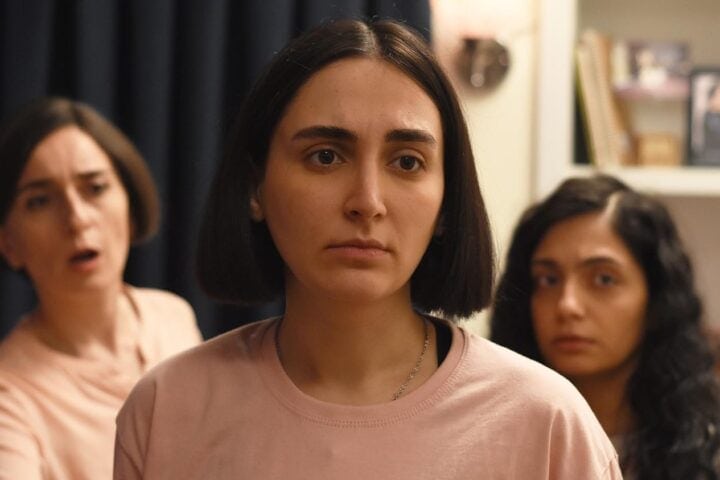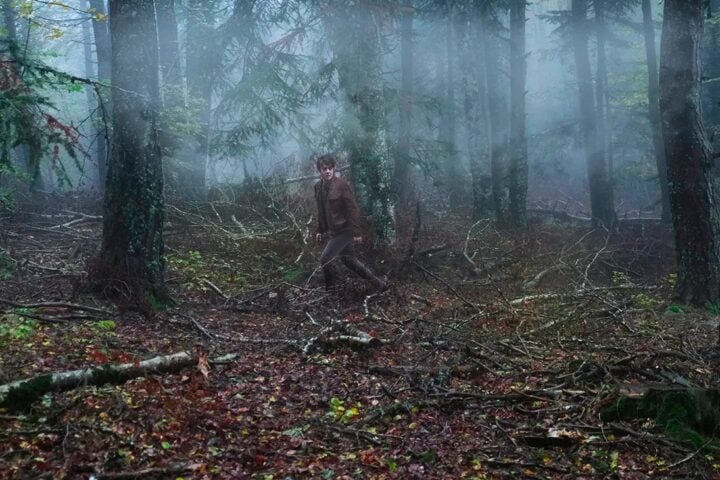Steven Soderbergh built his reputation in part on his “one for them, one for me” mentality, alternating between making high-profile studio projects and offbeat, and often lo-fi, experiments. At first glance, his latest effort, Presence, a haunted house story staged exclusively through the POV of a ghost, would appear to fall firmly in the latter camp. But while the out-there concept invites a host of tantalizing possibilities, the film’s adherence to conventional and uninspired plotting sees Presence fall into a blasé middle ground.
Opening in an empty suburban house, Presence establishes the viewpoint of its central apparition with a sequence where Soderbergh’s camera roams feverishly through the different rooms and up and down the stairs. Then, a real estate agent (Julia Fox) enters the picture, accompanied by some prospective buyers, a well-to-do married couple, Rebekah (Lucy Liu) and Chris (Chris Sullivan), and their two teenage children, Tyler (Eddy Maday) and Chloe (Callina Liang). The family is immediately impressed with the beautiful older home, and in the literal blink of an eye, it’s occupied and furnished with its new residents’ belongings.
Employing a slightly distorted frame, Soderbergh’s cinematography, credited to his pseudonym of Peter Andrews, initially emulates the hovering movements of a spirit, even memorably imbuing this perspective with something resembling a semblance of life. At one point, when the camera looks out a window, we somehow feel the spirit’s anxiety in being trapped inside. Then, as the spirit begins to overhear some of the problems bubbling underneath the surface of this maybe-not-so-perfect family, like some vague but potentially illegal goings-on at Rebekah’s work or Chloe’s withdrawn behavior in the wake of her friend’s death from a drug overdose, one can sense the ghost’s confusion and unease in the subtle jerks of the camera.
Presence sets up a classic scenario, with a family’s turmoil providing fertile ground for a spirit to manifest itself more overtly. But instead of twisting the idea of the spirit’s own troubles mirroring those of the family in a fresh direction, or at least in a way that parallels the film’s formal conceit, David Koepp’s screenplay ends up settling for the derivative.
When Tyler, a high school jock who’s revealed to be a bully, starts bringing his shady drug-toting friend Ryan (West Mulholland) around and Chloe takes a liking to him, it’s immediately apparent that doom is afoot. The ghost senses this as well and attempts to warn the family, through the usual banging and moving objects around, while the series of events that follow, which track Ryan’s dubious intentions with Chloe, proceed through the same telegraphed twists seen in any number of run-of-the-mill supernatural films from the last several decades.
The unoriginality of Presence’s story eventually calls out the POV conceit as a one-note gimmick, especially when the tension is dialed up in the film’s second half. When the family calls in a spiritualist, Lisa (Natalie Woolams-Torres), to survey the situation, she launches into a portentous monologue about how the spirit exists simultaneously and uneasily in the past and present. But Soderbergh’s camera, instead of casting us into a purgatorial state of being and having us feel that unease, mostly settles for striking voyeuristic poses.
Because Oz Perkins’s I Am the Pretty Thing That Lives in the House and H.P. Mendoza’s I Am a Ghost ran with a similar conceit in nervier directions, and by tapping into deeper wells of emotion, Presence can’t help but disappoint. Koepp has also proven adept at exploring similar themes with two of his own haunted house films as a director, the intensely creepy Stir of Echoes (from which Presence largely cribs its climactic reveal) and You Should Have Left, both of which periodically present their supernatural occurrences through a peculiar distortion of time and space. Compared to those films, Presence comes off as a pro-forma doodle, a time-killer until a project comes along that really inspires Soderbergh to flex his muscles.
Since 2001, we've brought you uncompromising, candid takes on the world of film, music, television, video games, theater, and more. Independently owned and operated publications like Slant have been hit hard in recent years, but we’re committed to keeping our content free and accessible—meaning no paywalls or fees.
If you like what we do, please consider subscribing to our Patreon or making a donation.






